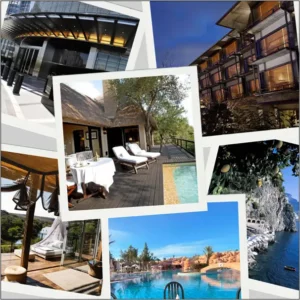 The luxury hotel industry represents the pinnacle of accommodation, providing guests with unparalleled experiences in comfort, service and amenities. Whether for vacations, business trips or romantic getaways, luxury hotels are designed to create lasting memories. However, these experiences can vary greatly depending on the region of the world in which they are located. Thus, this article aims to explore the specificities of the luxury hotel industry across different regions of the world.
The luxury hotel industry represents the pinnacle of accommodation, providing guests with unparalleled experiences in comfort, service and amenities. Whether for vacations, business trips or romantic getaways, luxury hotels are designed to create lasting memories. However, these experiences can vary greatly depending on the region of the world in which they are located. Thus, this article aims to explore the specificities of the luxury hotel industry across different regions of the world.
Luxury hotels in Europe: between traditions and modernity
Luxury hospitality in Europe has deep roots dating back to the Middle Ages with inns and coaching inns catering to travelers of the aristocracy and royalty. However, true luxury hotels as we know them today began to appear in the 19th century.
As a result, luxury hotels in Europe are distinguished by historical richness and architectural diversity. European luxury hotels offer a unique experience that combines old world charm with modern conveniences.
It is from its rich cultural and historical heritage that the luxury hotel experience in Europe is inspired. Heritage preservation, culinary diversity, and commitment to well-being and sustainability are key aspects that define luxury hospitality in Europe, notably through iconic practices and must-see hotels that embody the link between tradition and modernity.
Cuisine, gastronomy, heritage: French know-how
In France, luxury hotels, particularly in Paris, are synonymous with refinement. Establishments like the Ritz Paris, the Plaza Athénée and the George V embody French excellence with their sumptuous suites, Michelin-starred restaurants and prestigious spas. Personalized service and attention to detail are at the heart of the experience, making guests feel like royalty.
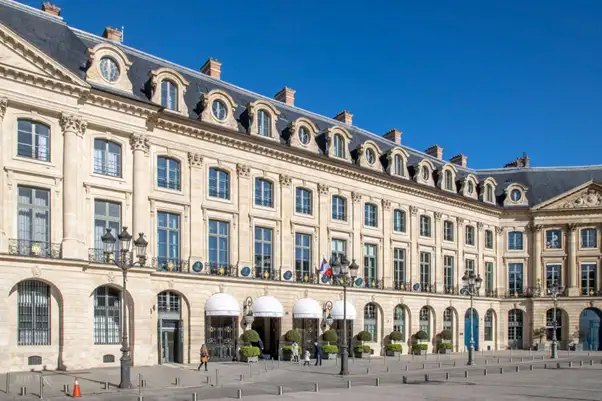
Le Ritz, Paris
The Ritz in Paris is renowned for being one of the pioneers of luxury hotels in France. It was followed by other prestigious establishments such as the George V in Paris (1928) and the Carlton in Cannes (1913), which became popular destinations for wealthy and famous travelers.
Paris is also a destination for fashion and art lovers, which is reflected in the luxury hotel offerings. The Shangri-La Paris, with its breathtaking view of the Eiffel Tower, offers culinary experiences inspired by Asian gastronomy, while the Peninsula Paris combines contemporary art and historic design to create an elegant and sophisticated setting.
Beauty and modernity in Italy
In Italy, the emphasis is on lifestyle and natural beauty. Hotels on the Amalfi Coast, like the Belmond Hotel Caruso or the Hotel Santa Caterina, offer spectacular sea views and first-class services. In Tuscany, establishments like Il Borro combine luxury and history, offering stays in historic wineries with modern facilities.
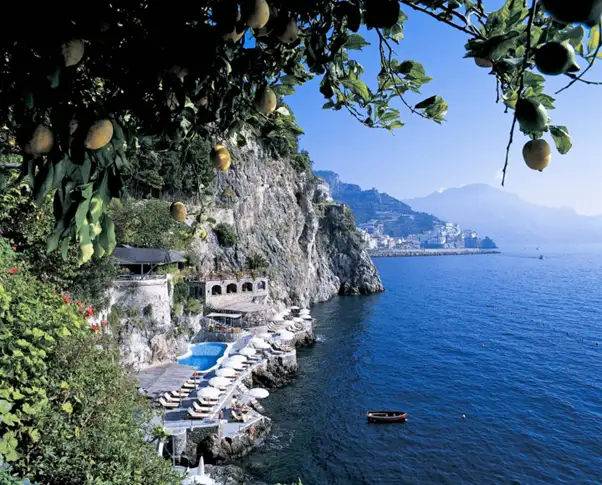
Hôtel Santa Caterina, Italie
Vue sur la côte Amalfitaine
We can also mention Venice and its emblematic canals; the city of romantics offers hotels like the Aman Venice, where guests can stay in 16th-century palaces while enjoying modern technology. The Lake District, with establishments such as the Grand Hotel Tremezzo on Lake Como, offers a combination of stunning natural scenery and refined luxury.
Combining luxury and nature in Switzerland
Switzerland does not hesitate to offer a luxurious experience integrating the environment. Hotels like Badrutt’s Palace in St. Moritz and Dolder Grand in Zurich offer luxurious experiences with stunning views of the Alps. Services often include upscale outdoor activities, such as skiing, hiking and spa, allowing guests to relax in stunning natural surroundings.
Ski resorts like Gstaad and Zermatt are also home to luxury hotels such as the Gstaad Palace and the Chedi Andermatt. These establishments combine comfort and Swiss tradition, with comprehensive wellness offers and exceptional gastronomic experiences. In summer, the mountains become a playground for lovers of hiking and water sports on the alpine lakes.
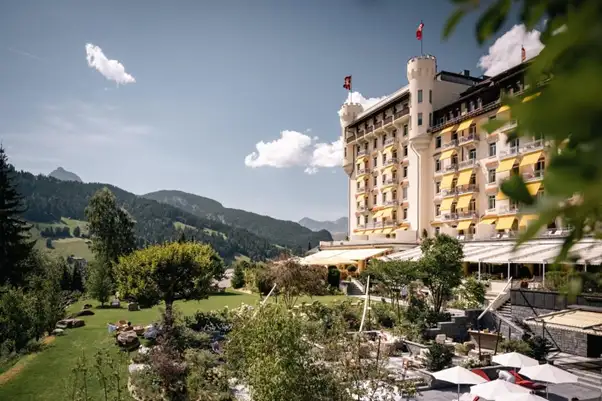
Gstaad Palace, Suisse
Luxury hotels in Asia: an even more marked juggling between tradition and modernity
If in Europe the link between tradition and modernity is very present, this phenomenon is even more marked in Asia. Many luxury hotels in Asia have incorporated elements of traditional architecture, decoration and service, creating a unique experience that blends modernity and local culture. Additionally, luxury hotels in Asia often emphasize wellness and spirituality, with spas, yoga retreats, and meditation offerings.
Luxury hotels in Asia often incorporate local cultural elements into their design, activities and services. For example, tea ceremonies, local cooking classes, and cultural tours are frequently offered. Although luxury hotels in the West also incorporate elements of local culture, cultural integration in Asia is often more immersive and profound.
Japanese hospitality: omotenashi
Omotenashi is a Japanese concept deeply rooted in the culture of hospitality and service. This is a fundamental Japanese concept that translates into sincere and anticipatory hospitality. This term is not limited to simply providing good service, but encompasses an entire philosophy of welcoming and caring for guests,
An essential characteristic of omotenashi is anticipation of the needs of others. Rather than simply reacting to requests, those who practice omotenashi strive to anticipate and respond to needs before they are even expressed. This involves paying special attention to guests, whether that means carefully preparing a room or personalizing services for them.
In luxury hotels in Japan, omotenashi manifests itself in meticulous attention to detail and a commitment to guest well-being and satisfaction, going well beyond usual standards of service.
Another example of tradition in Japanese luxury hotels is the kaiseki dinner. This is an expensive meal, often reserved for distinguished guests or to celebrate important events. Following a specific ritual, this meal can last at least two hours.
More than the dishes themselves, it is the aesthetics, the atmosphere and the presentation that are essential. For example, in Kyoto, the Hoshinoya Kyoto offers immersive experiences in Japanese culture with rooms overlooking traditional gardens and kaiseki dinners.
Thus, in Japanese luxury hotels, customers can discover traditional rituals, while enjoying high-quality modern services since the Japanese fully integrate their culture and traditions within the CHR sector.
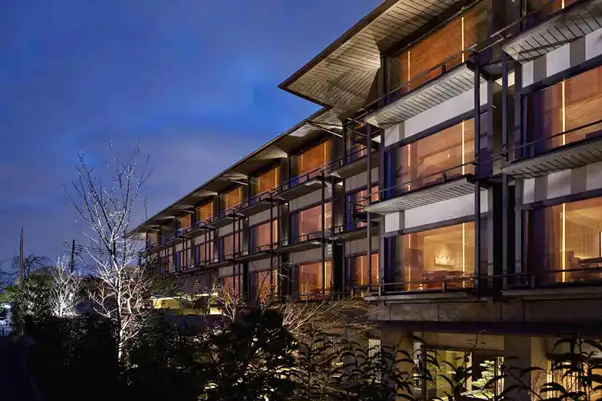
The Ritz-Carlton Kyoto, Japon
A tropical paradise in Thailand
In Thailand, hotels like Mandarin Oriental Bangkok and Banyan Tree Phuket offer luxurious experiences in enchanting tropical settings. Guests can enjoy private beaches, world-class spas and personalized services, all with a typically warm Thai welcome.
Chiang Mai, with its mountains and temples, offers luxury retreats like the Four Seasons Resort Chiang Mai, where guests can relax in private lodges surrounded by rice fields. Koh Samui, with its white sand beaches and turquoise waters, offers establishments such as Six Senses Samui, combining well-being and comfort in a heavenly setting.
In the Middle East, opulence and extravagance
With its wealth and rapid development, hotels located in the Middle East are distinguished by luxury hotel experiences characterized by opulence and extravagance. Luxury hospitality is best seen and known for its unique blend of modern opulence, architectural innovation, and rich cultural traditions. The region has become a leading destination for luxury travelers, attracted by the extravagance of its hotels and the incomparable quality due to the massive innovations incorporated into the hotels. The continued development of ambitious projects and economic diversification ensure that the Middle East will remain a key region for luxury hotels in the years to come.
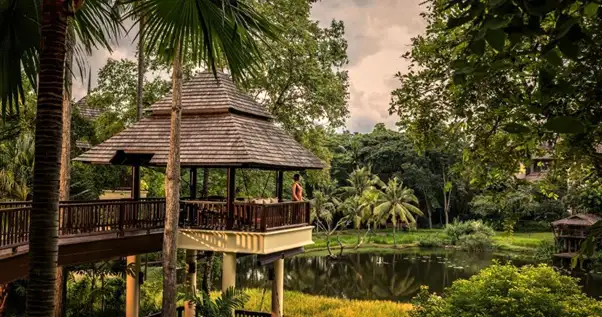
Four Seasons Resort Chiang Mai, Thaïlande
Futuristic luxury in the United Arab Emirates
In Dubai and Abu Dhabi, hotels like the Burj Al Arab and the Emirates Palace represent the pinnacle of futuristic luxury. These establishments offer sumptuous suites, gourmet restaurants and luxurious spas. Impressive architecture and technological innovations are at the heart of the experience, creating an ambiance of modern, cutting-edge luxury.
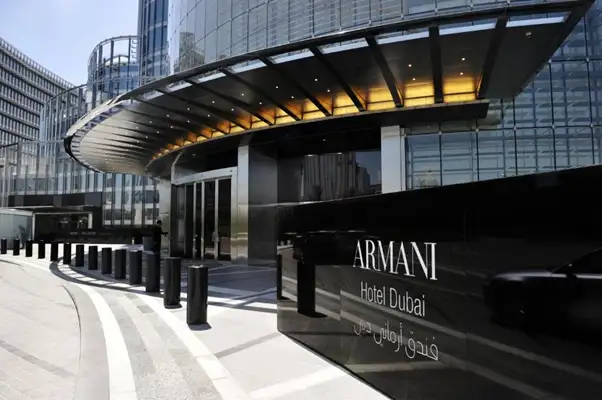
Armani Hotel Dubai, Émirats arabes unis
There is no need to introduce the Burj Khalifa, the tallest building in the world, which houses the Armani Hotel Dubai, offering a unique luxury experience designed by famous fashion designer Giorgio Armani. In Abu Dhabi, hotels like the Qasr Al Sarab Desert Resort by Anantara offer desert retreats with activities like camel safaris and dinners under the stars.
Luxury hotels in Africa and its authenticity
If luxury hotels in the West are characterized by architectural, culinary diversity and more urban or seaside luxury experiences, luxury hotels in Africa are distinguished by a deep integration of nature and local communities in its activities. , thereby offering unique safari and wilderness adventure experiences. African countries, with their vast landscapes and rich biodiversity, offer luxury hotel experiences that highlight nature and authenticity.
Luxury safaris in South Africa
In South Africa, luxury lodges like Singita Lebombo Lodge and Royal Malewane offer luxury safaris where guests can observe wildlife in their natural habitat while enjoying top-notch services. These establishments combine modern comfort and immersion in nature, creating a unique and enriching experience.
Kruger National Park is home to lodges like the Sabi Sabi Earth Lodge, which offers earth-carved suites and personalized safari experiences. The Cape Town region, with its vineyards and coastal landscapes, offers hotels like the One&Only Cape Town, offering a combination of urban luxury and outdoor activities.
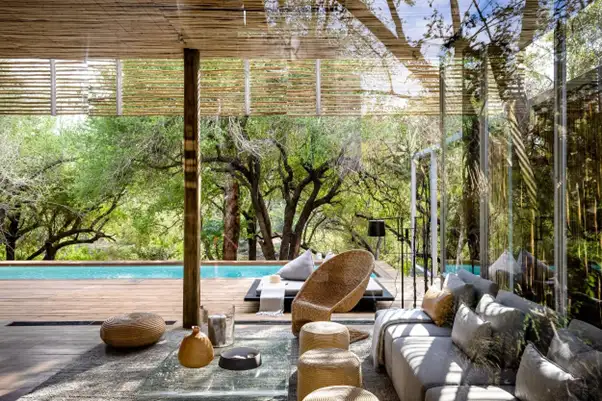
Singita Lebombo Lodge, Afrique du Sud
Charm and mystery in Morocco
In Morocco, hotels like La Mamounia in Marrakech and the Royal Mansour offer a luxurious experience steeped in charm and mystery. Traditional architecture, lush gardens and exceptional service allow guests to immerse themselves in Moroccan culture while enjoying modern comforts.
The city of Fez, with its historic medinas and souks, is home to luxury riads like Riad Fez, where guests can stay in renovated traditional houses with interior courtyards and fountains. In Essaouira, establishments like Heure Bleue Palais offer views of the Atlantic Ocean and an ambiance of tranquility in a historic setting.
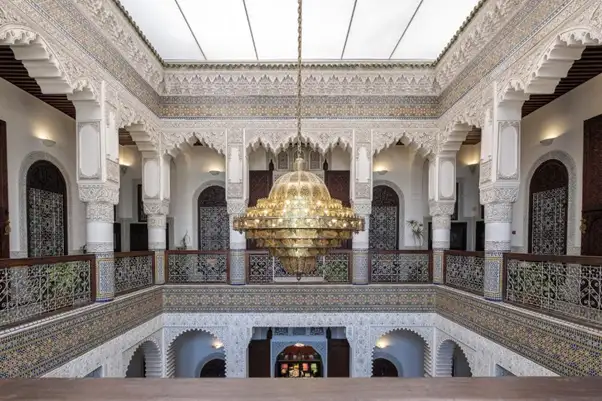
Riad Fès, Maroc
The luxury hotel experience in a nutshell
The luxury hotel experience varies greatly from one region of the world to another, with each destination offering its own quirks and charms. Whether it is the classic elegance of Europe, the exoticism of Asia, the opulence of the Middle East or the authenticity of Africa, luxury hotels aim to create unforgettable experiences for their clients. Customer experience varies significantly across different regions of the world. It is obvious that certain know-how, innovations, technologies and standards are similar or even identical from one region to another due to the nature of the CHR sector being strongly linked to tourism and trade. However, the integration of local cultural elements are the keys to a different luxury hotel experience depending on the chosen destination.

